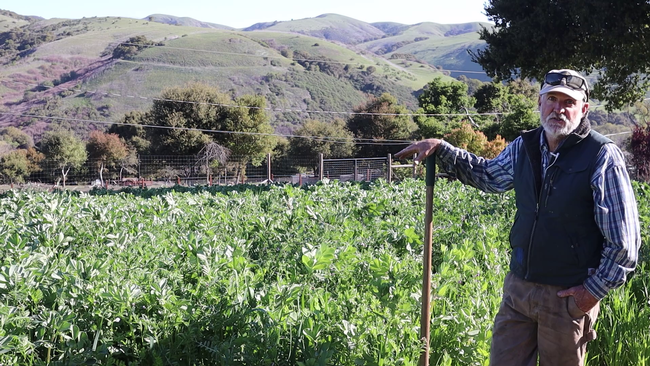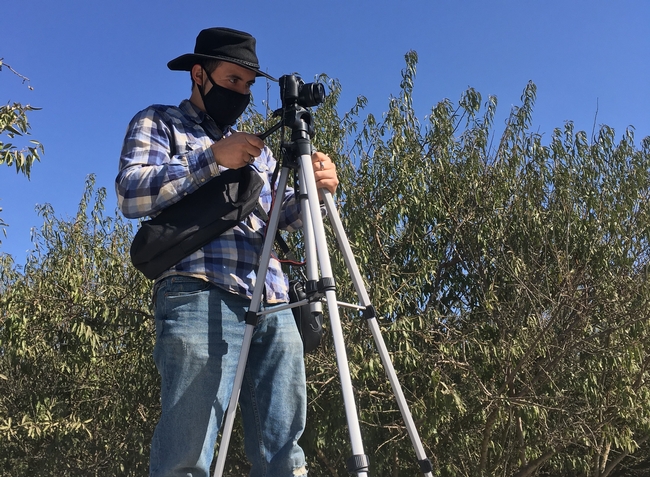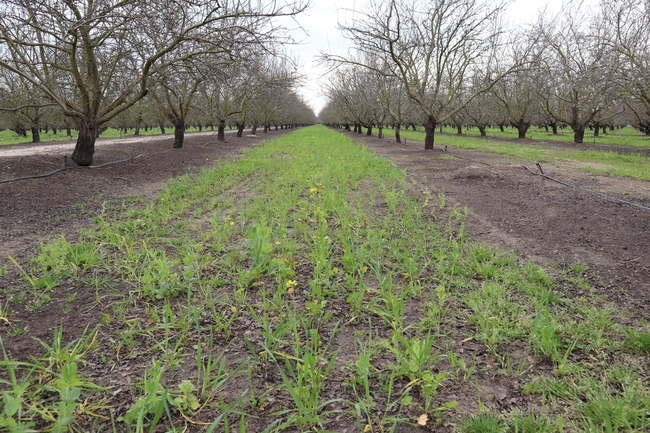
Posts Tagged: Urban agriculture
UC offers resources for urban farmers at EcoFarm
University of California scientists will be participating in the 44th Annual EcoFarm Conference Jan. 17-20 in Pacific Grove. EcoFarm participants gather to celebrate and learn about advances in farming and food systems throughout the state. This year, the three-day conference will highlight Black, Indigenous and People of Color communities that depend on agriculture, while also showcasing the new technological advances that further the development of agriculture.
Researchers from the UC Davis Veterinary Teaching Hospital's Department of Population Health, the Western Institute of Food Safety and Security and UC Agriculture and Natural Resources will be attending the conference to highlight the importance of food safety and technical skills in urban farming.
At EcoFarm, the Western Institute of Food Safety and Security will showcase its Civic Urban Farmer Program with an exhibit. The program, led by UC Davis assistant project scientist Sara Garcia and supported by UC Cooperative Extension, strives to uplift BIPOC communities.
The Civic Urban Farmer Program
The Civic Urban Farmer Program – a no-cost, 11-week program for farmers in the Sacramento region and Bay Area – provides technical support for new and upcoming urban farmers through webinars and in-person events. The program is available for any race, gender, age and skill ability, and seeks to provide safe, expert advice for farmers at any scale.
Soil health, composting, pest management, business marketing, food safety and urban policy are among the topics covered in its lecture-style classes.
Earlier this year, the program graduated its second cohort, with the support of two nonprofit organizations, Three Sisters Gardens in West Sacramento and Common Vision in Oakland. The program is supported by industry professionals, researchers and government officials, as well as local nonprofit and non-governmental organizations.
Elina Niño, UC Cooperative Extension specialist in apiculture, joined the Civic Urban Farmer Program to support urban farmers with training on managing pollinators to increase crop yields and create value-added products such as honey. The success of the pollinator program revealed that small urban farmers desire resources and education that are tailored specifically toward the cultivation of healthy and safe food.
For more information about the Civic Urban Farmer Program, visit https://www.wifss.ucdavis.edu/urbanfarmers.
Organic Agriculture Institute
The UC Organic Agriculture Institute, led by UC Cooperative Extension specialist Houston Wilson, will have an exhibit at EcoFarm. UC Organic Agriculture Institute brings together growers, certifiers, consultants, community groups and other stakeholders with UC research and extension personnel to share information about organic farming.
For more information about the UC Organic Agriculture Institute, visit https://organic.ucanr.edu.
Workshop speakers
Several UC Cooperative Extension advisors will be speaking at EcoFarm, including Richard Smith, UCCE emeritus vegetable crops advisor; Patricia Lazicki, UCCE vegetable crops advisor; and Margaret Lloyd, UCCE small farms advisor.
Connect with @ucanr on X, Instagram and LinkedIn.
Backyard chickens stay healthy with help from UC researchers, website
In recent years, there has been a rise in the number of backyard poultry farms as people have taken an increased interest in farming. With raising these animals comes new challenges in taking care of them and ensuring they stay healthy.
However, there is a gap between the needs of these small avian communities in Californians' backyards and the current services available that generally work for service large-scale poultry operations alone.
This is where Beatriz Martinez Lopez, professor of infectious disease epidemiology, and Alda Pires, associate professor for Cooperative Extension and agronomist, come into play. Both in UC Davis School of Veterinary Medicine, the two women work on projects addressing avian influenza, animal health and food safety needs of people raising backyard poultry and livestock.
“Alda has a lot of experience and her work is amazing,” said Martinez Lopez.
To better address the diseases and problems associated with raising birds in the California context, they completed a series of needs assessments to understand the animal health requirements of small farms and backyard chickens.
“It has helped us be more organized and structured in our outreach,” Pires said. “There is a need to apply simple, practical biosecurity plans that are adapted for multiple species to small-scale, backyard and diversified farms.”
Through a multistate project funded by the USDA National Animal Disease Preparedness and Response Program, they created a website, FARM PPE, for producers to easily access biosecurity plan templates and additional resources. PPE stands for prepare, prevent and evaluate to reduce disease risk.
“Our clients are benefiting from the structured network we created,” Pires continued. “This website project, FARM PPE, aims to improve uptake of biosecurity measures on small-scale farms, by focusing on farmers and other professionals, including extension educators and veterinarians.”
The website project also created several trainings for farmers and educators to generate consistent messaging for small-scale farms.
With backyard birds being one of the potential sources of the highly pathogenic avian influenza virus, it is important to understand how the disease could spread to commercial flocks. The major challenge of the project is the complexity of the human/wildlife interface and the difficulties in predicting where an outbreak may arise.
Together, Martinez Lopez and Pires have published several papers about modeling disease transmission, and the work yields valuable information about hotspots for targeting surveillance strategies and wildlife surveys.
Their professional partnership is rooted in their personal connection; the scientists met as graduate students in 2006 and were delighted to cross paths again at UC Davis.
“Our collaboration started with friendship and our common interests in epidemiology and animal health,” said Pires.
As exemplified by their own careers, Martinez Lopez and Pires stress the importance of networking, getting involved and taking risks.
“Invite farm advisors and outreach partners from the beginning of the process so that they are part of the team,” Pires said. “That way you can create solutions that will give them the knowledge and resources they need.”
Growing Food & Land Access/Security with Urban and Peri-Urban Farms on Faithlands
On August 25th, UCCE's Urban Ag & Food Systems Program tabled, paneled and supported the 8th Annual Food, Faith and Farms Conference in San Rafael, CA, hosted by Interfaith Sustainable Food Collaborative. The national Faithlands Conference, coordinated between Interfaith and the Agrarian Trust, which hosts the national Faithlands web page as a hub for sharing resources, followed on August 26-27. Rob Bennaton, Urban Ag and Food Systems Advisor, was panel moderator for the Successful Farms and Gardens on Faith Community Owned Lands panel. Julia Van Soelen Kim, North Bay Food Systems Advisor led a workshop focused on Making the Most of Commercial Kitchens, and Vince Trotter, Sustainable Ag Coordinator & Agricultural Ombudsman with UCCE Marin County, led a different workshop on Halal and Kosher: Exploring Relationships with Local Small Livestock Producers. Julio Contreras, UCCE Community Education Specialist III with the UCCE Urban Ag & Food Systems Program, shared urban farming information, supported and facilitated throughout the conference.
The discussion was on one of the most challenging hurdles for beginning and immigrant farmers: securing land to grow food. Meanwhile, religious institutions own lands throughout the United States that are often suitable for agriculture. These plots of land may vary in size from a 1,000 square foot community garden to over 100 acres. Partnerships can allow faith groups to simultaneously save resources, advance food security, connect traditional faith-based stories to land and agriculture, and help small farmers overcome economic and structural barriers. The presenters described innovative projects, including a farmer leasing from a Seventh Day Adventist middle school that successfully transferred ownership 3 times in Sonoma County, CA. There was also a farmer who leased land from her church while developing a farm project, allowing for her to scale to the point she qualified for a USDA loan for a piece of land that has a home and infrastructure. Finally, partnerships were highlighted in which a perennial food forest and seed bank on the grounds of a 4-acre Episcopal Church site were established.
The Faithlands movement is growing nationally to connect and inspire faith communities to use their land in new ways that promote ecological and human health, support local food and farming, enact reparative justice, and strengthen communities. On the Agrarian Trust's Faithlands web page, download the free FAITHLANDS TOOLKIT A Guide to Transformative Land Use. Interfaith is a regional and national organization which supports congregations of all faiths, denominations and backgrounds by connecting them with farmers and supporting farm stand initiation, farmers markets, and CSAs.
The idea is innovative and yet traditional, since so many faith-based groups are doing community-based food systems work, such as emergency food distribution, operating commercial-scale kitchens, or stewarding lands that could be cultivated by local farmers.
In particular, lands stewarded by faith-based groups in urban areas present a huge opportunity for cultivation by urban farmers, given high costs of land values in cities. Land for Good is another great organization that supports land transfers for farming and the development of land use agreements. Their amazing ToolBox web page has significant resources for building and negotiating leases for- and with- farmers and landowners.
The conference had a great turnout with powerful speakers and groups doing inspiring work around the nation. Speaker Rabbi Justin Goldstein from Yesod Farm+Kitchen in Fairview, North Carolina, opened the conference, sharing key points on building relationships for indigenous lands stewardship, and the process of returning this unceded land. Food justice and sustainability leaders representing 47 different religious communities were in attendance. While most came from the North Bay and East Bay, there were also participants from elsewhere in California and eight other states.
As described on the Interfaith Sustainable Food Collaborative website, “For the first time the conference included tours of farms and gardens at 7 different faith-community sites. Diverse speakers included 8 farmers growing food on lands owned by religious institutions. Ammar Ahmed of Islamic Circle of North America in Washington, D.C. spoke about the response of Muslim communities in the U.S. to hunger during theCOVID Pandemic. He called on attendees to help with the national effort by Muslim and Jewish groups to urge USDA to make kosher and halal meat available to observant Jews and Muslims through an emergency food program. Advocates are concerned about protein options available to observant individuals who utilize TEFAP, The Emergency Food Assistance Program (A letter signed by some 47 members of Congress went toUSDA last week; we will keep the Interfaith Food network apprised of how to help with this work.)” - Steve Schwartz, Executive Director, Interfaith Sustainable Food Collaborative.
In the Bay Area, South Berkeley, East and West Oakland, and South Hayward congregations have established small farms and gardens with their congregations. UCCE's Urban Ag & Food Systems Program with Alameda County RCD and Interfaith is providing technical support to a new East Alameda Gurdwara farming initiative managed by the Sikh community there. If you know of a faith-based group interested in this work, please reach out to Interfaith Sustainable Food Collaborative. Our Urban Ag collaborative team is also ready to work with you.
Cover cropping season has begun: Free recorded webinars, demos available
Cover crops, typically planted in early fall, deliver a host of agricultural and conservation benefits. But many growers have gone away from planting them due to technical challenges and extra costs associated with the practice. In partnership with the Contra Costa County Resource Conservation District, two University of California Cooperative Extension advisors collaborated to support farmers' cover cropping efforts and reduce costs.
Kamyar Aram, UCCE specialty crops advisor for Contra Costa and Alameda counties, and Rob Bennaton, UCCE Bay Area urban agriculture and food systems advisor, developed online project content for a free educational series on cover cropping, which entails growing non-cash crops to add beneficial biomass to soils.

“Our site visit videos include a diversity of cropping systems, operation types and scales, and levels of experience with cover crops, so we really capture a variety of perspectives,” Aram said. “Now, with the videos online, I hope that they will serve as tools for other farm educators, as well as a resource for growers directly.”
When the COVID-19 pandemic scrapped plans for in-person workshops and visits, the series organizers pivoted to online webinars, starting in fall 2020, which drew more than 150 participants. The recorded videos – which cover basic methods, financial assistance, tips for orchards and vineyards and more – expanded the potential reach and impact of the series far beyond Contra Costa County.
“Each video, whether it's a webinar recording or a virtual site visit, emphasizes different aspects, and the titles are designed to help viewers find the resources they are most likely to benefit from,” said Aram. “There really is something for everyone.”
In particular, the organizers of the series recognized the importance of including technical and extension support to urban and semi-urban farmers in the East Bay and beyond.
“We wanted to make sure to include practical support from fellow farmers that was both accessible and relevant to our diverse small and urban farmers,” said Julio Contreras, UCCE community education specialist. “This meant covering topics like seeding with spreaders or by broadcasting – using small equipment and machinery or no-till systems – and even cover cropping in planter boxes.”
Aram and Bennaton also credited their Contra Costa Resource Conservation District partners: Ben Weise, agriculture conservation manager; Derek Emmons, agriculture conservation coordinator; and Chris Lim, executive director.
The project, funded by a Specialty Crops Block Grant from the California Department of Food and Agriculture, was also made possible by the generous contributions of time and expertise from presenters and hosts of farm-site visits, according to Aram.
“I hope that the videos will enjoy a long life online; they really contain a wealth of knowledge,” he said.
The series is available for view at http://ucanr.edu/CoverCropsCoCo.
Drought hurts urban farmers, too
Extreme drought is changing agriculture across California — and urban farming is no exception.
Many community farms and gardens cultivate land owned by city or county departments, schools and private landowners. Lucy Diekmann, a UC Cooperative Extension urban agriculture and food systems advisor in Santa Clara County, says that how those institutions handle rationing or surcharges set by water retailers makes all the difference for urban farmers. Diekmann co-authored a 2017 study looking at how urban agriculture in Silicon Valley was affected by the last period of extreme drought.
For example, priced-based water conservation strategies had very different outcomes depending on the landowner. Diekmann and her co-authors learned that three-quarters of Santa Clara County's community farms had their water bill paid by a project sponsor such as a nonprofit or school, and the sponsor absorbed the increased costs. On the other hand, one city-run community garden raised fees by 27% in one year to discourage water use. Some gardeners either left, dropped off the waitlist or chose smaller plots.
Diekmann and her co-authors point out that a major challenge for water management in urban agriculture is the lack of data. Many community farms and gardens don't have their own meters.
"We recommend that cities and counties subsidize the cost of meters, give financial support for installing watering systems that support conservation, and offer irrigation training," Diekmann said.
Because the water landscape is so uneven for urban farmers — usually in ways that benefit well-resourced groups — Diekmann and her co-authors also write that “affordable, consistent water prices for all UA (urban agriculture) users” must be part of all cities' urban agriculture policy portfolios.
You can read Diekmann's full study at https://www.tandfonline.com/doi/full/10.1080/13549839.2017.1351426.









